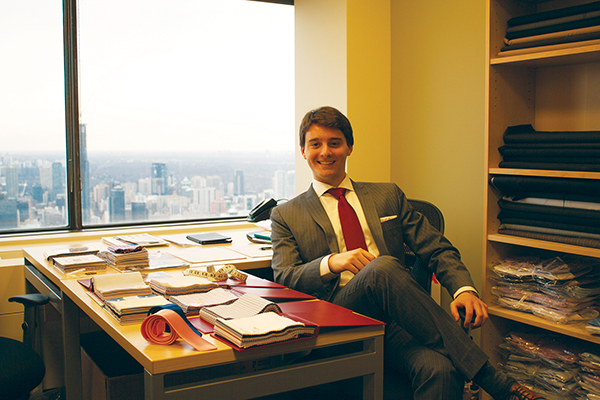A plan tailored for success
May 22, 2015
Share

As Talon Lloyd (Comm’15) explains it, his company – Lloyd and Company Bespoke Tailoring – is a meeting of an old world business with 21st century technology.
In a time when so many young entrepreneurs are focused on apps, Mr. Lloyd has taken a different tack, introducing bespoke tailoring – where garments are custom-made – to the needs of today’s consumer – a quality product without a lengthy wait.
Like apps, however, the key to the startup is the use of the Internet along with understanding the needs and wants of the market, in particular young professionals in the financial district of Toronto.
The premise is simple. He has taken a specialized industry and put it in the hands of the consumer. Forget the traditional visit to the tailor in his shop.
“What I am doing is utilizing technology so that it optimizes this business for today’s consumer,” he says. “The way we run online appointments, the way that we use our mobile POS (point of sale) system that allows me to go into offices and collect payments locally, the way that we can take measurements through our online system where we actually teach somebody how to measure themselves and then they can submit their own measurements.”
With a supplier in Hong Kong, where expert tailoring is still available and affordable, Mr. Lloyd is able to provide a high-quality product quicker and cheaper compared to the traditional model.
This meshing of old and new recently earned him the $5,000 top prize at the annual Paul and Tom Kinnear Business Plan Competition, hosted by the Queen’s School of Business.
With Lloyd and Company Bespoke Tailoring successfully up and running for two years now, Mr. Lloyd’s business plan for the competition was based on improving the delivery system and more suited to the customer. The money will now be put to adding QR codes to the product so the customer can track exactly where their orders are, from the measurements up to delivery.
“The approach that I took in my presentation was how do we optimize the customer relationship, specifically looking at after somebody places their order, how can I not only track that order from manufacturing to delivery, but how can a customer maintain an understanding of where their order is,” he says. “Right now we send everything off to our supplier and then it arrives in a box a few weeks later. Then, when I have it in my hand, I can reach out to the customer and say I have your product. In the meantime I don’t know whether the product is in the air or if it is in the cutting stage, the sewing stage.”
Today’s customers, he explains, aren’t willing to merely sit back and wait for their orders to show up. They want to know exactly where it is and what is going on. The other benefit to the QR code system is that he will also be able to keep track of the orders and deal with any delay-causing issues as they arise, such as a fabric being out of stock.
The other key is the minimal overhead required for his concept. Owning or renting a store in downtown Toronto means a massive initial investment, while a “pop-up” shop that sets up temporarily at a hotel lacks the image his clientele are looking for.
So Mr. Lloyd is using a shared-office model, where another company that owns the entire floor of a building at Bay and Wellington streets in Toronto’s financial district, segments out offices to smaller businesses, such as Lloyd and Company.
There’s also a shared reception, providing the professionalism he wants and his customers demand.
As for the future Mr. Lloyd has big plans, including expanding to other financial centres around the world and taking on more of a management role.
“Ultimately, I’m a business student. I would like to see this operated and use what I’ve learned at school to advance the business end as opposed to being the salesperson,” he says. “You can only be in one place at a time as a salesperson. But the way that we’ve started this business it can be leveraged and scaled. I can’t be in every financial centre selling at the same time so ideally I would like to remain as involved as I can on the sales side but I’ d like to be in a position where this business can run on its own without me involved day-to-day.”